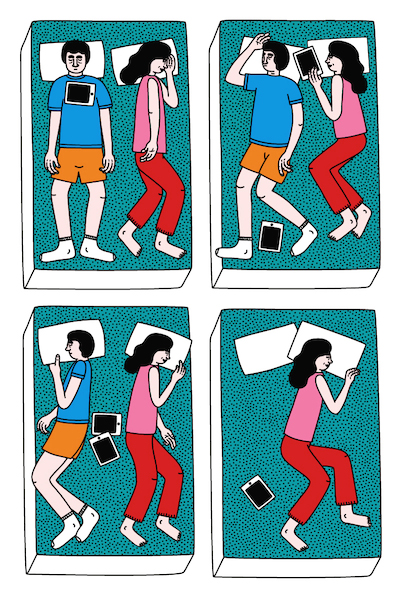Sexual Lack-tivity
Despite what the tabloids will have you believe, young people are having less sex than ever Why have the numbers of us getting down, gone down?

“20 minutes – anything less than that and he gets kicked out the bed.”
“No way! If I can manage five that’s pushing it.”
“Five? I don’t know how she puts up with you.”
Last weekend I was in a café with friends, discussing our sex lives. We were not, as anyone who overheard might have assumed, talking about our staying power, but how long after sex one should wait before looking at one’s phone. It’s a conversation that comes up increasingly often and some people think it’s something we should be taking more seriously.
Last year a study published by the Lancet, the world’s leading medical journal, found that British people aged between 16 and 44 have sex fewer than five times a month – an approximate 20% decline since 2000. Other research from the polling company Harris Interactive suggests that 80% of young Americans keep their smartphones by or near their bed and a surprising 20% have used a smartphone during sex.
One way to interpret this research is to assume these two separate issues are linked. Articles in every national newspaper, as well as tech blogs and women’s magazines, are convinced that the decline in sexual activity has been caused by the dramatic rise in our use of technology. This thesis suggests that no-one wants to go out on the chirpse when there’s 10 more levels of Candy Crush to play. Why would we have sex when we can watch Homeland on our iPads?
One thing we’ve certainly learned from the digital revolution is that competition has changed irrevocably. Gone are the days when two blockbuster films would battle it out each summer. Today, everything struggles for our precious attention: television, games, video-on-demand, social media and yes, our relationships and sex lives. We’ve all had an evening where the decision to race through a box set on Netflix has meant falling asleep fully clothed in front of the TV instead of undressed in bed.
But is this increased competition really the cause of our sexual decline? Surely the negative effect of technological distractions is more than offset by the number of opportunities for sexual encounters that technology is creating through dating websites and hook-up apps like Tinder and Grindr. Pornography offers the quick and easy promise of a minimal variation on an already familiar satisfaction. Besides, the Lancet’s report into our sex lives made no claims whatsoever about the role of new technology.
However, researchers did find that many people had reduced sexual function due to the depression and anxiety associated with unemployment, while people with jobs said they were busier as a result of the economic downturn. More often than not, the reason we’re bringing laptops into the bedroom isn’t because we’d rather be watching cat videos than having sex, but because three people in our department have left without being replaced and we’re working every hour of the day to provide cover, or because our wage is too paltry to cover spiralling rent so we have to pick up extra freelance work to make up the shortfall.
There are, of course, longer-term effects that technology is having on our ideas of coupling and sex. A lot has been written about the huge impact of internet pornography on our relationships. Many have sought to link pornography to countless societal, psychological and sexual problems – some of these theories have been scientific; many more have been ideologically motivated.
Overall, the scientific evidence hardly supports a definite conclusion on the effect of porn on the frequency with which we have sex. The New Naked, a popular book by sexual health expert Harry Fisch, found that actively enjoying porn can cause sexual dysfunction and men who regularly watched porn found it more difficult to become aroused during sex. In their 2008 paper titled Self-Perceived Effects of Pornography Consumption, UCLA psychology professors Gert Hald and Neil Malamuth interviewed young men and women and found that respondents construed the viewing of hardcore pornography as beneficial to their sex lives, their attitudes towards sex and their perceptions and attitudes towards members of the opposite sex.
There are more social pressures on humans to control sexual urges, plus there are more diversions which provide the psychological highs that we receive from sex. But perhaps looking for a direct effect of internet pornography on existing relationships is too facile. The Marxist theorist Franco Berardi, writing 30 years ago about the effects of technology on modern life, picked out the wider malaise that pornography can cause. He said that the intensity and precariousness of our work lives, combined with the advancement in computer technology, had led to human beings’ “limited libidinal energy” being overwhelmed. Writer Mark Fisher argues Berardi was showing how culture itself becomes de-eroticised.
“Pornography offers the quick and easy promise of a minimal variation on an already familiar satisfaction.” In other words, it’s not that pornography is satiating our desire for real sex, it’s that we’ve come to desire pornography, hassle-free and dependable, in our increasingly overstimulated lives.
And Berardi could not have foreseen the increasing hours we would come to work, the infiltration of technology into every aspect of our lives – or the degree to which porn would become accessible on the internet.
Let’s say you sleep with someone you fancy at a party. Before social media, you would have left that encounter with only your memories. That naturally creates a desire, both sexual and social, to see them again – it’s the basis of attraction. Now, of course, the first thing you do when you meet someone is an extensive background check via Facebook, Twitter and Instagram. No one likes the feeling when they find themselves scrolling back to a crush’s 2009 Facebook photos, but we’ve all been there. We tell ourselves we do this because of our real-life attraction – but what if we’re replacing attraction with this new, creepy, social probing?
“There are more social pressures on humans to control sexual urges, plus there are more diversions which provide the psychological highs that we receive from sex,” explains internet psychologist Graham Jones. “It’s all about the production of those ‘happy hormones’ in our brain. We constantly seek out opportunities to increase those hormones, so when a technology arrives which helps us do that we latch on to it. When it comes to social media, people can gain psychological highs even without actually having sex. They can engage in a ‘relationship’ with the person of their desires and can feel in love or attached in some way that produces the increase in brain chemicals that makes the individual feel good.
Most people know that this is false. They know, for instance, that the feeling they get by looking at pictures of, say, Brad Pitt every day is something that makes them feel great, but is not reality. Even so, some people will say that their online crush is better than sex because it produces more of those high-inducing brain hormones than actual sex.”
Technology has also made long-distance relationships far more likely. As we travel more and use the internet to meet potential suitors, we increasingly find ourselves entangled with people who aren’t in our city. Long-distance relationships are a relatively understudied phenomenon but one report found a 23% increase in long-distance marriages in the US between 2000 and 2005. As many as 75% of US college students have been in a long-distance relationship at some point.
We are having less sex. But this is unlikely to be because the availability of technology means we are spending less “eyeball minutes” with our partner. It’s a symptom of the pervasion of work into every aspect of our lives, combined with the desensitisation of our sexuality caused by new technology. We still have sexual encounters, but sometimes this means Skype sex, more often a kissing emoji before bed or a visit to YouPorn.
The question is whether we’re happy for this to be the new normal, for these technical signifiers to replace human touch. The obvious conclusion is that we should run straight into the arms of the closest person we can chirpse at a party. But it seems that making love in the cloud is working for an increasing number of people. They don’t wait to look at their phone after sex – they have sex with their phone.
Originally printed in Protein Journal Issue #13. Illustrations by Martina Paukova.


